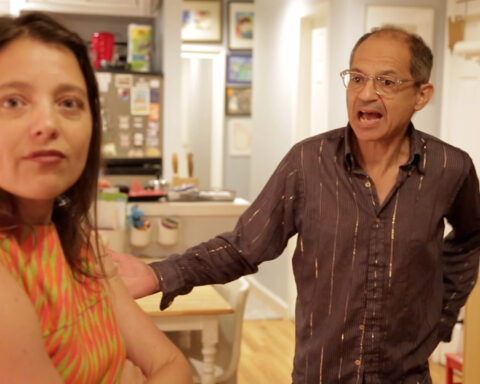Toni Morrison: The Pieces I Am
(USA, 119 min.)
Dir. Timothy Greenfield-Sanders
Apparently Toni Morrison makes one heck of a carrot cake. The secret, she says, is a lot of carrots. “Other people don’t put enough carrots!” she observes with her big, buoyant laugh that gives so much life to Toni Morrison: The Pieces I Am. Morrison doesn’t divulge her secret carrot cake recipe any further, but the iconic author instead offers some sweet and savoury wisdom as she opens up about the recipe for her great literary success. This long overdue portrait of the influential Nobel and Pulitzer Prize winning author of The Bluest Eye and Beloved is rich with Morrison’s down to earth wisdom, poetry, and humour.
Toni Morrison: The Pieces I Am avoids the usual cradle-to-grave arc of celebrity portraiture, but it conveys the bulk of Morrison’s story while capturing her significance. The author walks the audience through the story of her life, identifying key moments that shaped her voice and guided her on her path. It’s more about the carrots than the flour, sugar, and eggs that help make the cake.
Wikipedia has all the details, facts, and other conventional elements of biography, so The Pieces I Am creates a portrait of Morrison by focusing on the elements of everyday life that she relishes. Take, for example, her fondness for rising with the sun and writing in the early morning. On one level, this nugget of insight adds to Morrison’s earthly and wisely observant character. It also speaks to her drive and dedication as she adds that she needed the extra hours of writing time before her kids began their days, and her duties as a working single mother didn’t leave much time for writing.
Similarly, Morrison’s insight into her expertise as a teacher and editor tells viewers about how she supported herself while crafting her early novels. These recollections also reveal how Morrison experienced an all-consuming bout of imposter syndrome while working in a literary scene that was controlled by older white men with conservative views about the kinds of people they considered serious writers and the kinds of stories they considered great literature. Morrison says that she always defined herself as “a teacher or editor who writes” in the early years of her career because there was a cognitive disconnect between her awareness of her talents and her belief that she, too, could enjoy a career as a novelist. The doc conveys the awakening, both personal and collective, that arose when Morrison and others realized the value of a book written in the voice of its Black female author.
Director Timothy Greenfield-Sanders (About Face: The Supermodels Then and Now) interviews Morrison at length, as well as a number of her peers and supporters, like Oprah Winfrey, activist Angela Davis, author Walter Mosley, poet Sonia Sanchez, and cultural critic Fran Leibowitz. These interviews all come together to create a valuable oral history of Morrison’s body of work and its significance in conveying the experiences of Black Americans, particularly Black American women, and asserting their place in the literary canon. They unpack Morrison’s novels and reflect upon the treasure of seeing female friendship brought to life in Sula, the experience of entering a young Black woman’s psychology and feeling her sense of inadequacy in The Bluest Eye, or of the wonder of recognizing the interplay of diverse experiences in Song of Solomon. When Oprah finally appears, sings high praises for Beloved, and recounts her determination to bring the novel to screen, the film portrays Morrison as a cultural phenomenon who broke through nice markets into the mainstream.
The Pieces I Am celebrates the singularity of Morrison’s voice in the literary canon. Both Morrison and her fellow interviewees stress the necessity of the author giving voice to Black experiences, words, and perspectives. One interviewee praises Morrison’s literature as “pedestrian,” which is often used as a pejorative in critical discourse, and articulates the great value in giving depth and meaning to lives regardless of their race, class, or creed. The film is undeniably important as an addition to the ongoing conversation about who has access to the ability to tell their stories and share their experiences with the world. When the film culminates with Morrison’s Nobel Prize win, and long-delayed celebration in American, it offers a timely #OscarsSoWhite-era commentary who is awarded for their work and of the implications of receiving the spotlight as a result of being celebrated.
Greenfield-Sanders shoots only Morrison in a direct address, while the other talking heads speak in conventional documentary-style interviews that look beyond the camera, rather than facing it head-on. The effect is remarkable as it gives special gravity to Morrison’s experiences and words as she reflects upon her journey. Her way with words is unmistakable as she sculpts her phrases slowly and carefully, tasting each word for the right nuance and complexity to convey her experience. These are not interviews, but poetry, which the film’s slow, buoyant music underscores wonderfully. By having Morrison immerse the audience with her words so intimately, the film envelopes a viewer in the wisdom of a master storyteller. It’s no wonder Morrison is so beloved.
Toni Morrison: The Pieces I Am opens in Toronto at Hot Docs Ted Rogers Cinema on July
p=.











